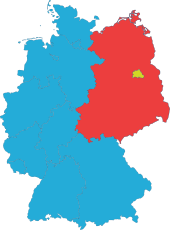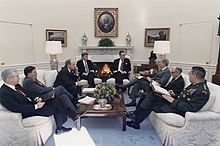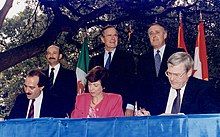Foreign policy of the George H. W. Bush administration
"[41] In a July 26 address to commemorate the thirty-sixth anniversary of the start of the Cuban Revolution, Castro said President Bush's trips to Poland and Hungary were "to encourage capitalist trends that have developed there and political problems that have come up there.
Bush praised Honduras for its "productive role in achieving a multilateral agreement on the peaceful demobilization and repatriation of the Nicaraguan resistance in conditions of safety for all concerned" and indicated American support for this policy.
[51] With the help of Costa Rican President Óscar Arias, the Bush administration restored full diplomatic recognition and negotiated the free elections that brought democratic forces to power in Managua.
[52] On March 4, 1989, government and banking officials announced the intent of the Bush administration to transfer nearly 2 billion in emergency loans to Venezuela to aid the country amid rioting and murders in Caracas during an economic crisis.
Economists and congressional Democrats contended that the Venezuelan events were reflective of the futility of the lending in return for attempts by the debtor nations to overhaul their inflation-wracked economies imposed by the Treasury Department under the leadership of James Baker.
From the White House point of view The attacks brought a festering issue to a climax: Bush ordered Operation Just Cause in December 1989, an invasion that was the largest projection of American military power since Vietnam.
[63] At a news conference on January 24, 1990, Bush was asked about his intent to play China against the Soviet Union in the event that Gorbachev fall from power and his successor is in the harsh mold of dictator Joseph Stalin.
Bush called China "a key player" in world events and cited its importance in geopolitics for why he would want the US to have either good or improved relations in spite of admitting the current circumstance was "unsatisfactory conditions".
[70] The Bush administration denounced the repression and suspended certain trade and investment programs on June 5 and 20, 1989, however Congress was responsible for imposing many of these actions, and the White House itself took a far less critical attitude of Beijing, repeatedly expressing hope that the two countries could maintain normalized relations.
"[84] On March 12, Bush met with former Prime Minister of Japan Noboru Takeshita for an hour to discuss shared economic issues and "the fact that their solution will require extraordinary efforts on both sides of the Pacific.
Aboard Air Force One, Bush explained the positive of the trip would be securing a deal with Japan featuring the country pledging to buy an additional 10 billion in American auto parts each year until 1995 and that 200,000 jobs would be created over this period.
National Security Advisor Brent Scowcroft was reported to have informed President Bush of the military action during the evening and State Department officials engaged in a late night discussion over the matter.
[136] In late March 1991, President of Poland Lech Walesa traveled to the US, attending a White House welcoming ceremony where Bush praised him for his favoring of a democracy and backing of American efforts in the Gulf War.
[137] Later that day, Bush told Walsea that he had requested Congress agree to increase in grant assistance to new democracies such as the one in Poland the following year and announced "two new economic initiatives designed to help the nations of Central and Eastern Europe proceed along the path to growth and prosperity."
[144] In June, Secretary Baker met with Andrei V. Kozyrev in London for a three-hour discussion designed to be a last minute effort to secure a completion of new arm accords prior to the summit meeting between Yeltsin and Bush.
[147] On January 3, 1993, Bush and Yeltsin signed START II, a bilateral treaty banning the use of multiple independently targetable reentry vehicles (MIRVs) on intercontinental ballistic missiles (ICBMs).
[148] On April 13, 1990, Bush met with Prime Minister Margaret Thatcher for discussions on international issues afflicting the North Atlantic alliance such as German reunification, NATO, talks on the status of convention forces in Europe, the Lithuania situation, Iraq, and COCOM.
He affirmed that American support for the Afghanistan rebels would continue so long as their efforts were meant to produce "a stable, broadly based government, responsive to the needs of the Afghan people" and called for the resistance to back this principle.
In his remarks, Bush stated his satisfaction with Shamir visiting the US "in the first days of our brand new administration" and American "commitment to the security of Israel remains unshakable" in spite of differences in views on policy occasionally.
After Bush met with chief advisors at Camp David, Fitzwater stated it was "quite clear that Iraq launched these missiles against Israel just to split the coalition" and noted they had not been aimed at military targets.
"[131] On June 21, 1990, Bush announced the suspension of American discussions with the Palestine Liberation Organization for the group's failure to condemn a failed Palestinian attack against Israel in addition to its lack of disciplining for the perpetrators.
[186] On January 29, 1991, during a speech to the National Association of Religious Broadcasters, Bush pledged to lead efforts to bring peace to the Middle East following the conclusion of the Gulf War, administration officials saying the president's remarks "were intended to quiet Arab concerns about the mounting destruction in Iraq and to signal that once the fighting ends the United States will try to address the Israeli-Palestinian dispute.
"[193] On November 28, State Department officials announced the US and Iran had come to an agreement on the compensation of the 278 million to Teheran for undelivered equipment owned by the Iranians and made by Americans prior to the 1979 Islamic revolution.
The agreement along with the release of hostages Terry Waite and Thomas Sutherland were noted as being made possible by Iranian concessions and seen as reflections of "Teheran's eagerness to put these issues behind it and win acceptance by the West.
[195] In November 1990, Bush met with President of Syria Hafez al-Assad in Geneva, the White House releasing a written statement saying the two had discussed the Gulf War and agreed in preference for a peaceful solution to the conflict.
[195] In January 1991, Baker met with Assad for the purpose of maintaining Arab solidarity in the Gulf War, the meeting being followed by a news conference held by Syrian Foreign Minister Farouk al-Sharaa who stated Israel should not interfere, comments that were seen as indicating Syria would either switch sides or leave the coalition.
While the number of troops was considered too small to conduct a war against the Iraqi forces, "it appeared sufficient to give the Saudi Government the military and political backing that King Fahd needed to resist pressures to support a fellow Arab leader."
[203] With talk in early 2008 regarding a possible American withdrawal from the treaty, Carlos M. Gutierrez, United States Secretary of Commerce, writes, "Quitting NAFTA would send economic shock waves throughout the world, and the damage would start here at home.
[206] According to Roger Harrison in reviewing Sparrow's biography of Scowcroft: David Rothkopf argues: Michael Beschloss and Strobe Talbott praise Bush's handling of the USSR, especially how he prodded Gorbachev in terms of releasing control over the satellites and permitting German unification—and especially a united Germany in NATO.
[209] Andrew Bacevich judges the Bush administration was “morally obtuse” in the light of its “business-as-usual” attitude towards China after the massacre in Tiananmen Square and the uncritical support of Gorbachev as the Soviet Union disintegrated.














